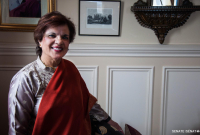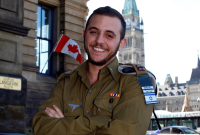Support strong Canadian climate journalism for 2025
At 5−foot−5 and 140 pounds, the soldier was "petit gars" — little boy — to 41 male Canadian Forces comrades. To their Afghan army allies, the armed woman in full combat gear was an object of unwanted flirtation.
Looking back, Cpl. Vincent Lamarre now realizes his Canadian comrades were closer to the truth of what he felt he was at the time, and has since become — a man. And he’s amused by how amorously he was regarded by the Afghan National Army.
"They were very surprised to see a woman do a man’s job," Lamarre explains in an interview. "I found it funny at the beginning, but sometimes I had to make them understand I am not an object."
Lamarre was a woman when he was deployed to southern Afghanistan’s blood−soaked Panjwaii region in 2010. Every other day, he drove a truck supplying gasoline, ammunition and food down a hazardous highway, through enemy terrain.
Toiling within the heart of the Taliban insurgency offered Lamarre a brief respite from the emotional war that had been raging inside him since he was three years old. Here, he needed only one label: soldier.
Six years later, Lamarre is nearing the end of another long, hard road: he’s changed his gender to become a man in uniform. He is prevailing with the full support of an institution that’s also grappling to accommodate transgender military personnel.
The Forces have been waiting for what happened Thursday when the Senate passed Bill C−16, which makes it a crime to discriminate on the grounds of gender identity and expression. Now, military policy planners hope to update their own transgender policy for commanders and rank−and−file personnel to ensure that soldiers such as Lamarre are more readily absorbed into their ranks.
"We went from Forces that weren’t tolerant at all about things like ’other−than−heterosexual’ to a Forces that is tolerant," said Lt.−Col. Pierre Sasseville, a 32−year veteran who is the director of the human rights and diversity branch.
"If you don’t accept it, the message is clear: get out of the Forces, or we’re going to make sure that you’re going to get out."
Lamarre, 31, was raised in St. Jean, Que., near Montreal, with an older brother and sister. His father died when he was two. A year later, when his older brother was getting circumcised, he asked his mother when he would get a penis, so he could do the same thing one day.
As a teen, he would refer to himself using the masculine French pronoun and people would always correct his grammar. Back then, his mom would ask him about transitioning, and is answer was always a "big no."
When he announced his decision a decade later, she was not surprised.
In 2008, Lamarre joined the Canadian Forces because he wanted to make a bigger contribution to his country. In addition to his time Afghanistan, he’s served in the Far North and took part in recent military efforts to beat back floodwaters in Quebec.
Coming home from Afghanistan was hard. He was engulfed by post−deployment stress on top of the ongoing gender struggle.
Life was good, on the surface. He found his first girlfriend, a woman he thought was the love of his life. He played on the men’s hockey team as a woman. But he had the nagging feeling something was wrong.
The turning point came on a holiday to Cayo Coco, Cuba. He went scuba diving, and dove deep into the clear Caribbean waters. But no air reached his lungs.
A huge wave engulfed him as he crashed upwards, gasping. "I was so afraid to die that I realized after I came back to the beach that I want to live my life and feel good. So I have to do something right now."
Back in Valcartier in early 2015, Lamarre began researching a change of gender on the Internet. He also found a Quebec City support group and went to a meeting.
The gathering that night marked the first time he was called by his newly chosen first name: Vincent.
He went home, and waited up into the early morning hours for his girlfriend to come home at the end of her work shift.
"I tell her I want to transition, I am not feeling good, I am depressed," he recalled. "She reacted aggressively, and now she is my ex−girlfriend because of that."
And so began the process. Psychological therapy. Then, on to hormones and a mastectomy, including follow−up surgery earlier this month.
He told his family, he told his military commander. That too, was a process, but it went well.
He used his sister as a bridge to his mother. She told him not to worry, and of course his mom accepted his decision. His brother wanted him to be the "godmother" to his first child. They worked out the details, and Lamarre’s spiritual stewardship was put in place.
He got some good advice from his old master corporal from Afghanistan. When he told his commanding officer, he was pleasantly surprised: Vincent wasn’t his first transgender soldier.
Sasseville said no one knows for sure how many transgender personnel are in the Forces, but an estimate of 200 would not be far off.
Moving forward, the Forces policy will balance two competing interests: educating the troops while ensuring cohesion in the ranks.
"Not all of the soldiers we enrol have PhDs and have seen the world," said Sasseville. "So when we talk about cohesion, let’s talk about educating our soldiers, reassuring them there’s nothing wrong there … life goes on."
For Lamarre, that means more plastic surgery. He expects it will take years, not months, to fully recover. He’s also found a new girlfriend, who accepts him for who he is. And he’s planning on a long career in the military.
When he looks back on Afghanistan, he realizes how he always had the power to seize control of his life.
"I would have liked to go back there because of the change we were bringing," he says. "But it’s out of my hands."





Comments